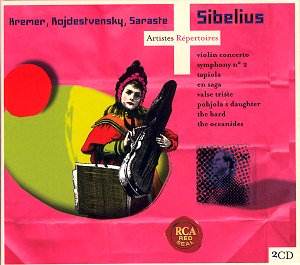There have been some gems amongst the forty ‘Artistes
Répertoires’ twofer series from BMG. Take the Ozawa Turangalila,
the Zinman Koechlin and the
Firkusny Martinů double. This collection is built around
the young Saraste's Sibelius series. Gidon Kremer's controversial
reading of the violin concerto is the dissenting cuckoo in the
nest.
Kremer tends to favour the cerebral and does
not stop to admire the flowers or share much rapture with the
listener. On the other hand if, perish the thought, you have had
enough of Oistrakh (BMG-Melodiya), Rachlin (Sony), Haendel (EMI)
or Kulenkampff (Music and Arts) then this might just be for you.
Recently having recorded the supercharged neo-baroque works of
Alfred Schnittke which at one time he seemed to 'own', Kremer
here sounds out of sorts. The orchestral role is in safe hands
but the tape seems to have suffered in storage for it sometimes
trembles. The signal wanders from channel to channel at times;
listen to the start of the second movement. The resonance of the
final bars of the concerto are cut off far too abruptly. This
is a pity because Rozhdestvensky does wonders with the oh-so-familiar
orchestral fabric. Kremer is exciting in the finale (his best
movement) and the orchestra, time and again, pick out, in coarse
grain, gestures and emphases that in other hands can go for nothing.
However there is no getting away from it; this is a flawed bloom
both audio-technically and interpretatively. So far as the latter
is concerned it is nowhere near as deficient as you might have
gathered from other reviews.
The music benefits from a high volume setting
but suffers from a lack of mass or sheer grunt. Compare the classic
FFRR Decca tapes, analogue mark you, of Horst Stein and the Suisse
Romande recording Pohjola and En Saga. Perhaps the
Finnish Radio orchestra and their hall are to blame but the beauties
of this set are to be found in the speedy and the slender. These
antelope qualities will suit collectors who prefer their Sibelius
without luxuriance. Saraste pushes ahead at all times - not one
to dawdle. This makes a change after so much Sibelius where the
conductor gives in to the discursive and to dalliance. His timings
for the symphony are 43.41 which is pretty swift for this symphony.
It benefits strongly from this pacy approach. Compare it with
the Koussevitsky on Naxos, the tension-slackened EMI-Barbirolli,
Maazel's Pittsburgh (Sony) and the Kamu (with same orchestra)
on DG. Even so it is not the equal of the Barbirolli/RPO recording
on Chesky or the live Royal Festival Hall recording by Beecham.
Saraste's Oceanides is given a towering performance which
never slackens it torque wrench grip. His En Saga is also
much better than respectable without the blowtorch intensity of
Furtwängler (Music and Arts), Horst Stein (Decca and London)
or the impatient tetchiness of Boult (Omega Classics). There is
a nicely pointed and superbly recorded Valse Triste but
kudos to BMG for evading the obvious - no Karelia Suite,
no Finlandia, no Swan, no Lemminkainen's Homecoming.
The series' distinctive collage-incongruity style
continues unabashed. Packaging: card fold, double stem, a meagre
paragraph or three of notes in English and French with timings.
Recordings reach forward from 1977 analogue for the concerto to
respectable 1988 digital.
A rough and ready presentation - thought-provoking
in the case of the concerto and in the Saraste-conducted works
a meeting of power and elegance.
Rob Barnett
